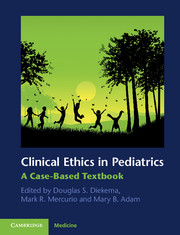Book contents
- Frontmatter
- Contents
- Contributors
- Preface
- Section 1 Core issues in clinical pediatric ethics
- Section 2 Ethical issues at the beginning of life: perinatology and neonatology
- Section 3 When a child dies: ethical issues at the end of life
- Section 4 Ethical issues posed by advances in medical technology and science
- 25 Minors as recipients and donors in solid organ transplantation
- 26 Enhancement technologies and children
- 27 Cochlear implants and deaf children
- 28 Ethical issues in the treatment of pediatric patients with disorders of sex development
- 29 Sterilizing procedures in minors with cognitive disabilities
- 30 Parental requests for intervention in children with lethal conditions
- 31 Genetic testing and screening of minors
- 32 The introduction of innovative technology into practice
- 33 Human subjects research involving children
- Section 5 Children, public health, and justice
- Section 6 Special topics in pediatric ethics
- Index
- References
25 - Minors as recipients and donors in solid organ transplantation
from Section 4 - Ethical issues posed by advances in medical technology and science
Published online by Cambridge University Press: 07 October 2011
- Frontmatter
- Contents
- Contributors
- Preface
- Section 1 Core issues in clinical pediatric ethics
- Section 2 Ethical issues at the beginning of life: perinatology and neonatology
- Section 3 When a child dies: ethical issues at the end of life
- Section 4 Ethical issues posed by advances in medical technology and science
- 25 Minors as recipients and donors in solid organ transplantation
- 26 Enhancement technologies and children
- 27 Cochlear implants and deaf children
- 28 Ethical issues in the treatment of pediatric patients with disorders of sex development
- 29 Sterilizing procedures in minors with cognitive disabilities
- 30 Parental requests for intervention in children with lethal conditions
- 31 Genetic testing and screening of minors
- 32 The introduction of innovative technology into practice
- 33 Human subjects research involving children
- Section 5 Children, public health, and justice
- Section 6 Special topics in pediatric ethics
- Index
- References
Summary
Case narrative 1: a minor as solid organ donor
A 15-year-old girl with end-stage kidney disease due to Wegener’s granulomatosis has been on dialysis since her diagnosis 18 months before. Her lung disease is quiescent. The transplant team has determined that she is ready for transplant and has identified no psychological or medical issues to delay the procedure. Each parent volunteered to be a living kidney donor, but both were blood type incompatible (they were both type A and she was a type O). The patient is highly sensitized due to transfusions received early in her illness, suggesting a long wait on the deceased-donor kidney list, even with some priority accorded children awaiting a kidney. Her fraternal twin accompanied her to a clinic visit and stated, “I want to give my sister my kidney. I’m blood type O, I know what I’m getting myself into, and I understand the risks. How do we make this happen?”
Should the transplant team accept the twin’s offer and proceed with a donor evaluation? Would the situation be different if the girls were identical twins? What if the twins were 8 years old?
- Type
- Chapter
- Information
- Clinical Ethics in PediatricsA Case-Based Textbook, pp. 143 - 147Publisher: Cambridge University PressPrint publication year: 2011



